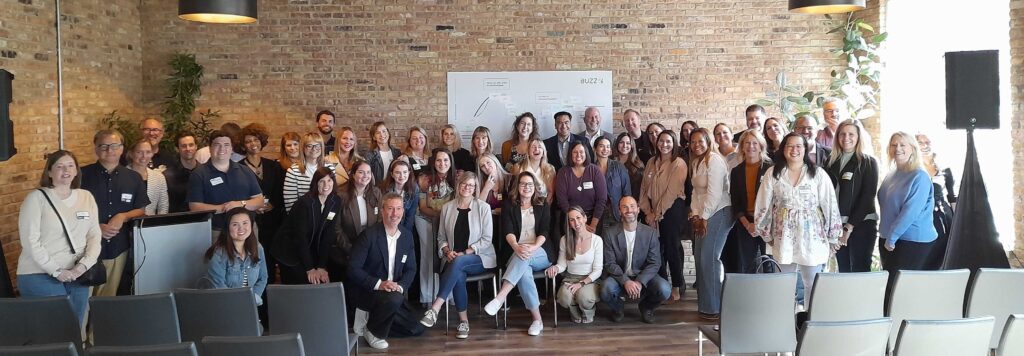In October 2024 we gathered industry leaders, technology experts, and a whole host of inspiring panelists together in Chicago for our first ever Buzz event. The concept was simple: Buzz is for sharing ideas and learning from your peers. This year, it’s all about AI: there will be no powerpoint slides, no lanyards, no sandwich platters, and no promotional material to speak of.

Here’s what we learned
1. While the appetite to use AI is there, the ‘how’ is still somewhat unknown.
Companies have bought into AI in a big way, with senior leaders rolling out mandates around usage and expecting manual work to decrease dramatically overnight. But insights practitioners (aka, you) are more trepidatious. There’s no doubt that AI has a lot of potential but how can you meaningfully use AI beyond idea generation and brainstorming? And how can you do any of it well without proper education and training on best practices?
This misalignment between promise and practice is leading to a lot of frustration. At Buzz, our in-house AI experts (Joel and Joel) suggested the following:
Be the team who “owns” AI in your organization. Take an active interest in implementing AI into your current work with readily available tools like ChatGPT, or commercial products that can help you analyze data at scale. If you have an in-house AI team don’t be afraid to ask for their help developing solutions that solve your problems.
We’ve built a library of AI prompts into our proprietary AI engine, which makes leveraging AI practical and simple for our team. This might be a great starting point for anyone looking to get better at using AI as a part of their day-to-day.
2. To successfully use AI you need to understand where the data is coming from and to assess your options like Switzerland might.
We can all agree there’s always a buzzword. Before AI we had big data, behavioral science, and syndicated data. But none of these topics have produced the same paradigm shift as AI.
That’s why it’s crucial to ensure that you’re using AI correctly and implementing proper rigor and guardrails into your processes. Somebody even mentioned withholding some of the data from your marketing partners, which we don’t condone…
Here are some examples of guardrails we discussed implementing:
- Don’t use AI on anything you can’t double-check. Don’t just create your reports and dump them, the insights teams have to take responsibility for the quality of the data they are providing.
- If you’re trying to research a niche audience, talk to them – don’t just talk to an AI stereotype of them.
- Set risk levels per product type for AI usage. Pharma? High risk – do not use AI. Salty cheese snacks? Lower risk – go ahead and ask ChatGPT.
There was much discussion about whether synthetic data is really as magical as some providers are suggesting. We’ve done our own internal testing, and believe that “extraordinary changes require extraordinary proof.” While we’ve seen synthetic data be able to reasonably mimic the past, we don’t have ‘extraordinary proof’ that it can predict the future. Be cautious and test, test, test.
3. Insights leaders have a real opportunity to own AI as a part of their overall remit.
AI, unlike NFTs or the Metaverse, is here to stay. But the question of where AI should sit within the organization came up again and again at Buzz. At a recent ESOMAR conference, Elaine Rodrigo, Reckitt’s Chief Insight & Analytics Officer made a case for insights to own the AI mandate. We explored who is best placed to ensure AI is being used properly, assess the viability of specific AI solutions, and ask the right questions.
Given the skillset of insights leaders, their ability to ask the hard questions, and the fact that they are skeptical by design, folks were optimistic that this might make sense for insights to “own” AI implementation.
At Buzz, we talked a lot about the hype-cycle and where we think the implementation of AI solutions sit on it. Being able to understand the why behind the how lead to a few lightbulb moments for attendees when it came to understanding what AI ownership should look like.
It was refreshing to be in a room of insights peers talking honestly about how they are using AI, where they see AI being a value-add, and what they hope the future of AI looks like.
See ya next time!